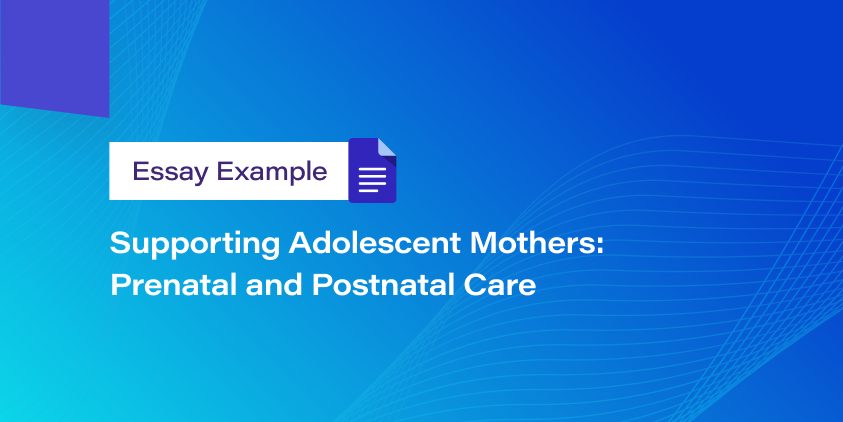Supporting Adolescent Mothers: Prenatal and Postnatal Care

Adolescent requires more physical care than an adult does. Moreover, adolescents need more intensive attention during their pregnancy period. This is because they have lesser life experiences than their adult counterparts. Having less experience makes it hard for them to cope with the changes they go through during pregnancy and birth. Dealing with these adolescents without prejudice makes pregnancy easier for them. Proper interaction with these adolescents is essential for the care of them. The number of adolescents getting pregnant rises every year. There are two types of adolescents, early and late. Early adolescent ranges between the ages of nine and thirteen, while late adolescent ranges between sixteen and nineteen. Late adolescents get pregnant more than their younger counterparts. This article deals with adolescents’ physical, emotional and educational needs during prenatal and postpartum periods.
Prenatal and Postnatal Health Adolescent Education
Pregnant adolescent experiences high rates of social problems when compared to pregnant adults. The two main problems are domestic violence and substance abuse. As seen in the case of Aisha, her mother has not approved of the pregnancy. Aisha has chosen to stay with her aunt, but she would like to stay alone with her boyfriend. Young adolescents are discriminated against since people consider girls as those who have lost their morals. This usually leads them to have low self-esteem and depression; more often, they are rebellious, and some of them may even contemplate suicide. This makes them take drugs to forget about the problems they are facing. These drugs increase health danger for both mother and unborn child. The nurses should encourage the adolescents. They should make them see that it was not an accident for them to get pregnant. Restoring their self-esteem would be a significant boost in helping them prepare for the birth of a baby. The nurses should teach them how to nurse infants at a tender age. They should also teach adolescents how to care for themselves before giving birth. This should enhance the safety of the mother and unborn child.
After the new mothers give birth, the nurses should teach them how to care for infants and themselves. The postpartum period is most likely to be overwhelming to the adolescent. Adolescents usually have a risk at this transition in life. This is because they lack enough resources and experience to endure stressful periods. Most of them usually have low self-esteem and fall into depression. Depression makes them not take care of the infants the way they should. The new mother should be taught proper eating habits to have enough energy to breastfeed the infant.
When helping the infants to sleep, protective care must be taken. It is recommended to swaddle the newborn for sleeping. The baby should be wrapped in a warm blanket for security and warmth. This keeps the baby from being disturbed by his/ her reflexes. This keeps the baby warm for the first days of his/ her new life. Swaddling should not be done tight. When wrapped tight, the soft bones of the newborn infant may deform. The baby should have enough room left at the bottom of the blanket. This should help the child to bend his/ her legs up and out from his/ her body.
When waking the infant, one should straighten his/ her body part. Baby sleeps comfortably; thus, when the mother straightens him/ her, this perks the brain and makes the infant wake. Newborn babies should be fed with breast milk for the first three months. Breast milk is rich in nutrients. It provides the child with antibodies. When breastfeeding, the mother should ensure the infant stays upright in her bosom. This helps to increase the bond between the mother and the newborn. When the child does appear sleepy during feeding, he/ she should not be overfed and should be allowed to sleep.
Conclusion
Adolescent mothers should be given proper care physically, emotionally and socially. When they face neglect, they see themselves as committing a massive crime. Most suffer from depression, while some bury themselves in substance abuse. Acceptance gives them an emotional boost and thus a high quality of health for the mother and the newborn. Since young mothers are new in the parental life, they should be educated on caring for themselves and their babies. They should be taught new feeding habits to have enough energy to feed the young. They should be shown how to feed the young and help them sleep. The nurses should show the new mothers how to observe the signs of their babies and understand their different meanings. This should help the mothers know what the baby’s cry means, thus making parental time easier.
📎 References:
1. Lundy, K. & Janes, S. (2009). Community health nursing: Caring for the public’s health. Burlington, MA: Jones & Bartlett Learning.
2. Mazurek, B. & Fineout-Overholt, E. (2010). Evidence-based practice in nursing & healthcare: A guide to best practice. Philadelphia, PA: Lippincott Williams & Wilkins.
3. McMurray, A. & Clendon, J. (2010). Community health and wellness: Primary health care in practice. Chatswood, NSW: Elsevier Australia.
4. Moyse, K. (2009). Promoting health in children and young people: The role of the nurse. Hoboken, NJ: John Wiley & Sons.
5. Truglio-Londrigan, M. & Lewenson, S. (2010). Public health nursing. Burlington, MA: Jones & Bartlett Learning.
